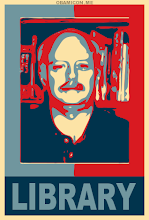Chapter Two, written by Violet Harada, focuses on fostering thinking across the curriculum and, in particular, the role a teacher librarian can play in the mix. In particular, the chapter looks at some of the "intellectual capital" that twenty-first century citizens must possess including:
- basic language proficiency
- scientific thinking
- competent use of ocmputers and applications
- decipher, interpret, and express ideas with visual media
- appreciation of cultural diversity
- proficiency in locating/evaluating/using information
One of the concerns, as has been mentioned elsewhere, is that there is not a lack of direction, but rather that there are too many directions; too many standards to guide us.
Unfortunately, in many schools we are viewed as "...providers of ancillary (and dispensable) services and gatekeepers of underused collections." Instead we should be pushing to be perceived as the person who provides depth to instruction and to learning.
Harada asserts that there are certain characteristics that showcase productive centers of learning and they include:
- Schools are learning organizations where stakeholders change norms and habits
- Empowerment is part of the school vision
- Schools create a foundation of thinking that relate pieces of information with other pieces of information
- Thoughtfulness is a key ingredient; how students percieve themselves as thinkers is important
When you align curriculum with these four characteristics, learning becomes focused on depth rather than breadth.
Our role in empowering learning in our schools works specifically because our jobs are structured in such a way that we can have an impact on the entire school population.
How this looks, like was discussed in Chapter 1, is related to the specific disciplines. What works in one discipline may not work in another. What it looks like for the disciplines can be:
- Language Arts: Literary appreciation/analysis require students be able to predict/validate/synthesize and the ability to analyze from multiple points of view.
- Social Studies: Students formulate questions/obtain data/test sources for accuracy and authority.
- Mathematics: Problem solving means students need to formulate problems and consider alternative strategies to solve the problems.
- Science: Using scientific inquiry asserts that students understand key questions/concepts that guide investigations.
Information Literacy: Searching for and using information requires student engagement in different formats/purposes.
Reaction
I had a particularly strong reaction to how we are viewed at some schools ("...providers of ancillary..."). Unfortunately, this is likely true. And, importantly, where this is true, the teacher librarian often plays a role in making in true. The connection that I see to the job and my livelihood is that when funding is low, they want to keep positions where they see the most benefit. Teacher librarians have the ability to make or break their positions.
How we relate to the others teachers in a school determines our ability to be successful. We are in a unique position to work toward changing the culture of a school and how students learn by collaborating with teachers in such a way that inquiry is key and that the goal is depth of learning.
One point I found interesting was how many of us have focused our efforts on tradtional tasks (using an online catalog, creating a bibliography, etc.). Yes, these are important skills, Harada asserts that, in addition to teaching those skills, we should also be teaching:
- Perception and recognition
- Storage and retrieval
- Organization and transformation
- Reasoning and utilization
- Metacognition
The question then becomes how we implement such strategies. We should:
- Generate questions
- Focus instruction on distinguishing between fact and opinion
- Use graphic organizers
- Have students reflect on they performed specific operations
Part of this requires the use of scaffolding, providing a temporary support for students, until they are able to perform the work on their own.
Key quote: In short, substantive learning requires focusing on a smaller number of critical ideas, concepts, and themes that can be studies in depth.
Related Articles
Zmuda, A., & Harada, V. (2008, April). Reframing the Library Media Specialist as a Learning Specialist. School Library Media Activities Monthly, 24(8), 42-46. Retrieved June 24, 2009, from Academic Search Premier database.
Yoshina, J., & Harada, V. (2006, April). Engaging Students in INQUIRY. School Library Media Activities Monthly, 22(8), 22-25. Retrieved June 24, 2009, from Academic Search Premier database.

I hope that you find the process of reading these chapters and then writing about them is a good exercise for you TL brain and advancement:-)
ReplyDeleteI think that the perceived view of the TL and the library program is certainly based on the TL currently in the LMC and past TLs or other TLs in the district. Our admin and other classroom teachers are not on CALIB nor are they doing any professional reading about libraries (probably) so we have to educate and inspire our staff all on our own.
I hope that the new folks to this program have learned this important lesson - it is up to them, and us, to advocate and inspire others to believe in the greatness of our library programs.
Agreed. If you cannot be the advocate and the inspirer, this job will be much harder and much less effective.
ReplyDelete